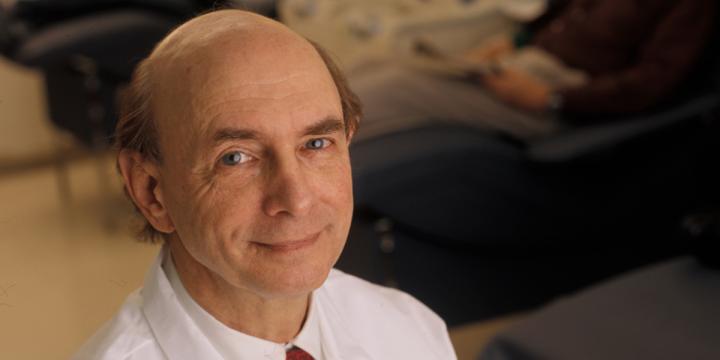
Credit: NIH
National Institutes of Health intramural researcher Harvey J. Alter, M.D., has won the 2020 Nobel Prize in Physiology or Medicine for his contributions to the discovery of the hepatitis C virus. Dr. Alter is a Senior Scholar at the NIH Clinical Center’s Department of Transfusion Medicine and shares the award with Michael Houghton, Ph.D., University of Alberta, Canada, and Charles M. Rice, Ph.D., Rockefeller University, New York City.
The Royal Swedish Academy of Sciences said, “Prior to their work, the discovery of the Hepatitis A and B viruses had been critical steps forward, but the majority of blood-borne hepatitis cases remained unexplained. The discovery of Hepatitis C virus revealed the cause of the remaining cases of chronic hepatitis and made possible blood tests and new medicines that have saved millions of lives.”
“I am overwhelmed at the moment, but so pleased that this originally obscure virus has proven to have such a large global impact,” said Dr. Alter. “There are so many persons at NIH who advanced my research, but for now I can only thank NIH, itself, for creating the permissive and collaborative environment that supported these studies over the course of decades. I don’t believe my contributions could have occurred anywhere else.”
Dr. Alter’s career at NIH has spanned more than 50 years where he focused his research on the occurrence of hepatitis in patients who had received blood transfusions. In the 1970s, despite the discovery of hepatitis B, Dr. Alter saw a significant number of patients receiving blood transfusions still developed chronic hepatitis due to an unknown infectious agent. Dr. Alter and his colleagues showed that blood from these hepatitis patients could transmit the disease to chimpanzees, the only susceptible host besides humans. Subsequent studies also demonstrated that the unknown infectious agent had the characteristics of a virus. Alter’s methodical investigations defined a new, distinct form of chronic viral hepatitis, which became known as “non-A, non-B” hepatitis. His work was instrumental in leading to the development of new diagnostic and therapeutic agents and providing the scientific basis for instituting blood donor screening programs that have decreased the incidence of transfusion-transmitted hepatitis to near zero.
“Harvey Alter is a scientist’s scientist – smart, creative, dedicated, persistent, self-effacing, intensely dedicated to saving lives,” said NIH Director Francis S. Collins, M.D., Ph.D. “His work to identify the nature of the hepatitis C virus has led to dramatic advances in protecting the blood supply from this very serious illness, and ultimately to the development of highly successful therapy.”
Dr. Alter had focused on viral hepatitis even before his work on hepatitis C. In the 1960s, he co-discovered the Australia antigen, a key to detecting hepatitis B virus. Later, he spearheaded a project at the NIH Clinical Center that created a storehouse of blood samples used to uncover the causes and reduce the risk of transfusion-associated hepatitis. In 2000, Alter was awarded the prestigious Clinical Lasker Award. In 2002, he became the first NIH Clinical Center scientist elected to the National Academy of Sciences, and in that same year he was elected to the Institute of Medicine. In 2013, Dr. Alter was honored with the distinguished Canada Gairdner International Award.
“Harvey is known for a very sharp sense of humor, a tireless, work ethic, and for treating everyone well,” said James K. Gilman, M.D., chief executive officer of the NIH Clinical Center. “As a long-time military physician, I am grateful to what Harvey and his co-winners have done to make it possible to provide a safe blood supply to the men and women who serve the country in uniform.”
Dr. Alter’s co-recipient Dr. Rice has received continuous NIH funding totaling more than $67 million since 1987, primarily from NIH’s National Institute of Allergy and Infectious Diseases.
For more on Drs. Alter, Houghton and Rice’s contributions to the discovery of the hepatitis C virus, visit the Royal Swedish Academy of Sciences site: https:/
###
About the NIH Clinical Center: The NIH Clinical Center is the world’s largest hospital entirely devoted to clinical research. It is a national resource that makes it possible to rapidly translate scientific observations and laboratory discoveries into new approaches for diagnosing, treating, and preventing disease. Over 1,600 clinical research studies are conducted at the NIH Clinical Center, including those focused on cancer, infectious diseases, blood disorders, heart disease, lung disease, alcoholism and drug abuse. For more information about the Clinical Center, visit https:/
About the National Institutes of Health (NIH): NIH, the nation’s medical research agency, includes 27 Institutes and Centers and is a component of the U.S. Department of Health and Human Services. NIH is the primary federal agency conducting and supporting basic, clinical, and translational medical research, and is investigating the causes, treatments, and cures for both common and rare diseases. For more information about NIH and its programs, visit http://www.
Media Contact
NIH News Media Branch
[email protected]




